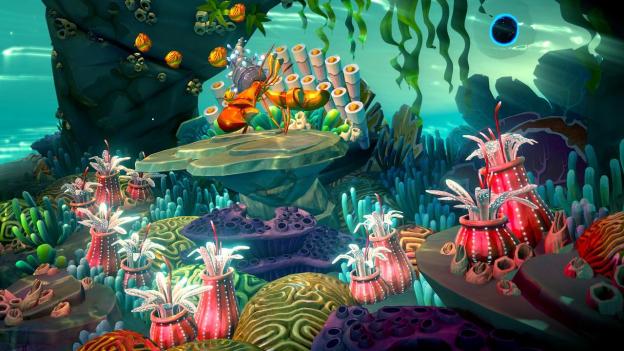
Fantasia. Disney’s third animated feature is more than 70 years old now, and it remains one of the most unique items in the studio’s catalog. It features just eight shorts set to classical compositions; eight magical escapes into worlds where menacing armies of animate brooms march silently while dainty hippos dance with the grace of Olympians. The images are fun and often goofy; the allure is in the music. Walt Disney said it best: “There’s a terrific power to music. You can run any of these pictures and they’d be dragging and boring, but the minute you put music behind them, they have life and vitality they don’t get any other way.”
In the world of interactive entertainment, few creative groups are more in tune with the power and importance of music than Harmonix. From Frequency to Dance Central, this is a studio that has defined and re-defined the way we relate to music through play. Fantasia: Music Evolved seeks to carry that trend forward with a fresh approach on Xbox platforms, leveraging the motion-sensing Kinect camera to create a physical connection between the players and the music they take an active role in shaping.

Story/Concept
Humble beginnings. Harmonix started working on Fantasia: Music Evolved three years ago, when Disney asked for a meeting at the 2010 Game Developer’s Conference. Early game concepts grew out of prototypes that the dev team started to play with following the release of Rock Band 3. The Harmonix crew quickly took to building a game based around the idea of exploring and being creative with music.
This development path led to the earliest glimmers of what would become Fantasia: Music Evolved. Billed as a spiritual successor to Disney’s 1940 film, it builds on the canon while also adding to it, serving up an entirely new set of worlds that come alive around music. Nearly everything you see can be interacted with and used to build a richer sonic landscape. In a first look demo, Harmonix showed off two of the game’s 10-plus worlds: the blue-tinged undersea wonderland of The Shoal, and the spewing steampipes of the brass-and-iron newspaper printing works of The Press.
Move over Mickey. Players assume the role of the new Sorcerer’s Apprentice in Fantasia: Music Evolved. The loose story sees Yen Sid – the master sorcerer that a younger Mickey Mouse served under in the original film – magically transporting you into his world to take the round-eared Disney mascot’s old job. There’s no formal interview for the new gig, however. Yen Sid favors actions over words. He expects you to prove yourself as you explore the worlds of Music Evolved and toy with the audio in each location.
In order to please Yen Sid you must visit and fully explore the sonic playgrounds that make up each world, and interact with the 25-plus songs in order to unlock additional content and earn high scores. Imagine if the songs in Rock Band were scattered across a series of virtual environments like progression-dependent collectibles.
Harmonix promises a diverse song selection in the finished game, with the final list determined by the present-day popularity and/or the sense of timelessness that a piece of music has. Our demo included looks at Queen’s “Bohemian Rhapsody,” Bruno Mars’ “Locked Out of Heaven,” and Kimbra’s “Settle Down.” It’s a considerable departure from the classical compositions of the original film, but it is in keeping with the Fantasia spirit of wrapping together a pleasing, familiar combination of sights and sounds.

Gameplay
Exploring Fantasia. The act of exploring in Fantasia: Music Evolved is completely dependent upon the Kinect. Sidestepping to the left and right pans across each world’s panoramic view. Your hands are used to guide the on-screen Muse, a glowing spot of light that doubles as a position indicator. The Kinect controls operate along the X, Y, and Z axes, allowing you to reach “into” the world to play with objects in the background. Each world-level view in Music Evolved features many points of interaction, with more unlocking as you successfully play through individual songs.
Songs are “played” using both hands in a variety of ways. The most common interaction sees you swiping one or both hands in one direction or another in time with the music, with the direction and timing indicated on screen by streaks of color. Players have the ability to change up the musical format at specific moments, with three arrangement options for each song. In the case of Queen’s “Bohemian Rhapsody,” the original recording is joined by an orchestral version and a harder-edged metal version. Arrangement switch points come up several times as an individual song plays out.
There are other points of interaction as well. At specific moments, a musical “prism” pops up that uses the same swiping mechanic, though the prism shifts as you swipe. Other interactions take a more creative shape, such as a wah wah pedal-like interface that allows you to adjust the character of the music in real time. There are even occasional solo moments that require you to “draw” out a pattern in the air with your finger. The pattern you create is translated into a musical arpeggio that then plays behind the song.
Musical sorcery. As additional points of interaction unlock in each world view, players build up a toolbox for creating increasingly lush arrangements all on their own. Finishing “Bohemian Rhapsody” reveals an oversized undersea turtle in The Shoal with an all-clam jazz band living on its back. Interacting with those clams in the world space opens up a zoomed-in view in which you can use your hand to “paint” out a jazzy arpeggio across the clams, which are divided into instrument-specific sections. Once you’re happy with your mix, you’ll hear the music you’ve created blend into the world’s sonic landscape whenever the clams randomly float into view.
Harmonix confirms that Fantasia: Music Evolved will only support two-player local multiplayer, though it’s not exactly clear how that will work yet. The game also features Leaderboards that tie into the scoring portion of individual song performances, which is based entirely on how well-timed your hand swipes are.
While the Leaderboards and the possibility of having two players in the mix hints at competitive elements, Harmonix stresses that this is a no-fail game. You’re still unlocking new musical toys to play with even if your scores are low. The game is very forgiving too; it’s possible to get technical and build elaborate pieces of music using the tools at your disposal, but beats and melodies are automatically quantized and auto-tuned so that your own compositions and in-song solos never sound terrible.

Presentation
It’s a musical world. Fantasia: Music Evolved‘s debut demo runs on a gaming PC built to the specifications of an Xbox One, so both The Shoal and The Press look sharp and individually unique. The Shoal’s blue-tinged undersea surroundings pop with shimmery pastels as all manner of fish and other sea life flit across your field of view. The Press, on the other hand, is all steam pipes and sharp angles, like peering into the inner workings of an elaborate machine. Robots glide across catwalks and clanking pipes grind out a regular beat. In both cases, visuals tie closely to sound, with what you see on the screen being mirrored in the ever-changing soundtrack of the world you’re visiting.
Takeaway
With Fantasia: Music Evolved, Harmonix aims to reinvent its approach to rhythm-based games yet again. The idea of turning the player into a “musical sorcerer,” capable of bending and shaping a composition with waves of the hand, is a simple and easy-to-grasp one at its heart. The game feels a bit rough in its current form, with the Kinect camera (Xbox 360 version) not always recognizing every hand movement in as timely a manner as it could. That said, the game isn’t due for release on Xbox 360/Xbox One until sometime in 2014, so there’s plenty of time to tighten things up.


